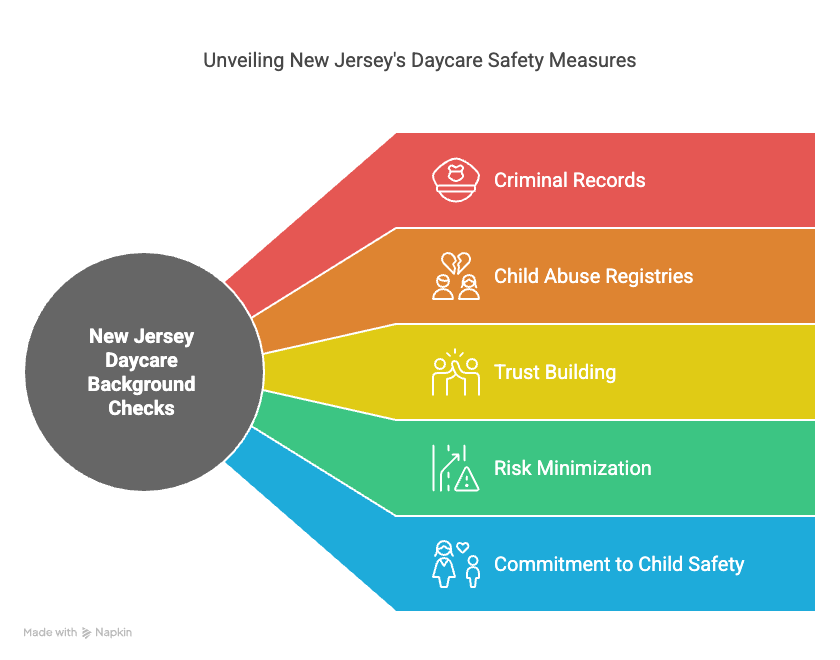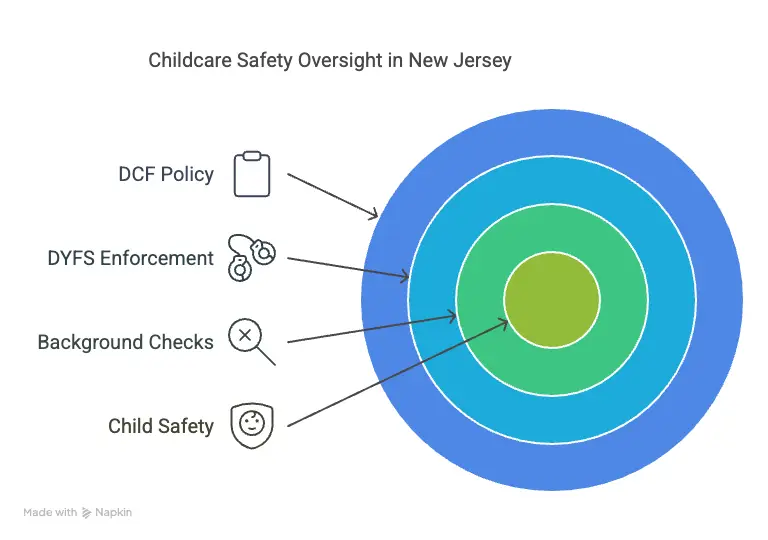When you're entrusting someone with the care of your child, trust is paramount. This is why New Jersey has stringent regulations for background checks in childcare settings. Whether you are a childcare provider, a concerned parent, or anyone interested in the daycare industry, understanding these requirements is crucial.
In this guide, we break down the nuances of New Jersey daycare background checks, including the roles of DCF and DYFS, fingerprinting requirements, and the potential disqualifications that applicants might face. Our aim is to provide a clear, comprehensive overview of the process to ensure the safety and well-being of children.
Key Takeaways
- New Jersey's childcare background checks are comprehensive measures to ensure safe environments for children, involving criminal histories and child abuse registries.
- DCF and DYFS are key agencies ensuring that childcare providers meet stringent safety standards, working together to oversee and enforce regulations.
- Fingerprinting is a crucial part of the process, using digital scans to reliably check state and national criminal histories.
- Certain criminal and behavioral histories lead to disqualifications, although appeals and reconsideration processes are available with proper documentation.
- DYFS extends checks to include prior interactions with child welfare services, ensuring individuals working with children have a clean record beyond criminal checks.
Introduction
Childcare today is more critical than ever with the rising number of working parents. As demand grows, ensuring the safety of these environments is essential. Parents need peace of mind. Providers must comply with laws that protect children.
In New Jersey, this begins with thorough background checks for childcare providers. The process isn't just a formality—it's a framework to ensure children are surrounded by trustworthy individuals.
This guide highlights the key elements of New Jersey's system. We'll explore the Department of Children and Families (DCF) and the Division of Youth and Family Services (DYFS), two agencies at the core of this process. Their guidelines are the backbone of childcare safety protocols.
Fingerprints and disqualifications are more than bureaucratic hoops. They are necessary steps in a wider effort to create secure environments. By understanding these requirements, you help build safer spaces for children.
Whether you're a parent or run a daycare, knowing these requirements empowers you to make informed decisions. It ensures compliance and elevates trust. Let's dive into the details that safeguard our children.
Understanding New Jersey Daycare Background Checks
A daycare background check in New Jersey is a series of evaluations aimed at ensuring those who work with children are suitable and trustworthy. These checks include criminal records, child abuse registries, and more. The objective is straightforward: to ensure a safe environment for children. This process helps build trust between parents and childcare providers, assuring parents that their children are in reliable hands.
Imagine hiring someone without knowing their past. It's a risk, especially when children are involved. New Jersey’s rigorous checks are there to minimize that risk. The checks sift through criminal histories and any record of child harm. They highlight any red flags, preventing individuals with certain past behaviors from being in positions of care.

The process in New Jersey is not just a formality; it’s a commitment to child safety. It reflects a broader ethos within the state to prioritize the welfare of its youngest residents. Is there a better way for you to ensure peace of mind when leaving your child in someone else’s care? These checks serve as a tool for building safer communities, one provider at a time.
By adhering to these checks, you’re not just following a protocol. You’re actively participating in a system designed to protect what's most precious: the well-being and safety of children.
The Role of DCF and DYFS
In New Jersey, the Department of Children and Families (DCF) and the Division of Youth and Family Services (DYFS) are key players in safeguarding children's welfare. DCF is a state agency committed to ensuring the safety, well-being, and success of children, youth, and families. It develops policies and standards for childcare providers, ensuring they meet stringent requirements.
DYFS, as a division within DCF, performs a critical role in implementing these standards. It directly oversees services for children at risk of abuse and neglect. This includes supervising daycare operations to ensure compliance with established safety protocols.
DCF and DYFS work hand in hand. While DCF sets the rules, DYFS enforces them. Together, they ensure that every person working in childcare undergoes a thorough background check. This partnership is intended to prevent individuals with histories of abuse or criminal activity from working with children.

By collaborating, DCF and DYFS provide comprehensive oversight of childcare environments. This system is designed to create a secure setting for children across the state. How does this impact you? If you're a childcare provider, understanding their roles helps you comply with regulations—a cornerstone for building trust. If you're a parent, it assures you that there's a meticulous process in place aimed at keeping your child safe.
NJ DCF Fingerprinting Process
In New Jersey, fingerprinting is a critical part of the childcare background check. The Department of Children and Families (DCF) uses it to ensure caregivers are qualified to work with children. It's not just about verifying identity; it’s a cornerstone of maintaining safety.
Overview of Fingerprinting
Fingerprinting involves capturing your fingerprints digitally. The main goal is to check for any criminal history at the state and national levels. By including both checks, New Jersey aims to catch offenses that might be missed if only one level were checked.
Steps to Completion
- Schedule an Appointment: After submitting your application, you’ll receive instructions to book a fingerprinting slot. Make sure to do this promptly to avoid delays.
- Prepare Proper Identification: Bring a valid photo ID, such as a driver’s license or passport. This is crucial for verification.
- Visit the Fingerprinting Center: On the day of your appointment, attend the designated center. Trained technicians will guide you through the process.
- Capture Fingerprints: The technician will use a scanner to capture your fingerprints. It’s quick and non-intrusive, usually taking a few minutes.
- Await Results: Once your fingerprints are submitted, results are typically processed within a few days to a few weeks. You’ll be notified of any findings or issues.
Technological Aspects
New Jersey uses digital biometric scanning for fingerprinting. This technology is more reliable than traditional ink on paper. It ensures that fingerprints are captured clearly and reduces the chance of errors. The clarity and precision of these scans help in accurately matching fingerprints with existing records.
Have you wondered how accurate this system is? The digital scans go through automated systems which are designed to detect even the smallest match, providing a robust layer of security in the background check procedure. It's effective, but if there are concerns, DCF has procedures in place to address any discrepancies.
Fingerprinting can seem like a technical hurdle, but understanding its role and process clarifies its necessity. It’s a safeguard for our children’s environments, ensuring that those entrusted with their care meet strict safety standards.
Disqualifications in Childcare Background Checks
Some hurdles in childcare background checks are unavoidable. In New Jersey, not everyone qualifies to work in childcare due to specific disqualifications. These aren't arbitrary; they're based on legal, moral, and safety standards.
Overview of Disqualifications
A disqualification generally means an individual cannot hold a position in childcare. This could result from criminal records or certain behaviors that raise concerns about safety. The aim is to prevent anyone with a harmful past from gaining access to vulnerable children.
Common Disqualifications
Some offenses almost always lead to disqualification. These include violent crimes, child abuse, and sexual offenses. Drug-related and theft crimes may also impact eligibility. Each case is unique, but these offenses paint a red flag scenario. Even civil court orders, like restraining orders, can influence disqualification.
Reconsideration and Appeals
Sometimes, people make mistakes. If you're disqualified, you have options. New Jersey allows for reconsideration or appeal. You must provide relevant documentation to support your case. This could include evidence of rehabilitation or character references. Submit these within the timelines specified, stressing your current suitability for childcare roles. It's a structured process, but diligence in presenting your case can lead to reconsideration.
Are you prepared for how past actions might affect your future in childcare? Understanding disqualifications is essential for anyone aspiring to enter this field in New Jersey.
DYFS Checks and Their Importance
DYFS, or the Division of Youth and Family Services, plays a critical role in childcare background checks. Unlike standard checks, DYFS focuses on more than just criminal history. They examine past interactions with child welfare services, including any reports or investigations related to child abuse or neglect. This adds an extra layer of scrutiny to ensure that those working with children have a clean history in all areas concerning child welfare.
The process begins with a thorough review of child welfare records. If an applicant has a history of child welfare involvement, this can be a red flag. Even if incidents didn't lead to convictions, they might indicate patterns of behavior that warrant attention. Such findings are essential for understanding the applicant's suitability for childcare roles.
DYFS findings can significantly impact hiring decisions. If a past incident indicates a potential risk to children, employers may decide against hiring. It's not just about protecting children from harm but also ensuring a safe environment for all. Employers rely on these checks to make informed decisions, balancing the need for staff with the imperative of safety.
DYFS checks emphasize that it's not enough to look at criminal records alone. Childcare positions demand a comprehensive review of any past issues related to child welfare. This approach helps create safer care environments, reassuring parents and supporting responsible hiring practices.
Addressing Common Concerns
When going through a background check, you might worry about privacy. Rest assured, your sensitive information remains secure. Background check companies follow strict regulations to protect this data. The information is accessed only by authorized personnel and is used solely for the verification process.
You're also likely curious about the timeline. Background checks in New Jersey typically take a couple of weeks, but this can vary. Several factors play into this, including the volume of applications and specific checks required for the role. It's wise to plan for some variability in timing.
Another concern could be the cost. Generally, the organization requesting the check covers these expenses. However, sometimes, the cost might fall on you, especially if it's for a role with a small business. It's best to clarify this detail with your potential employer upfront.
Understanding these aspects can ease the process and provide clarity on what to expect during your childcare background check in New Jersey.
Conclusion
Every step in the background check process reflects one overarching goal: ensuring the safety of children in daycare environments. Understanding these procedures is not just beneficial but critical for anyone involved in childcare, whether you're a provider or a parent. New Jersey's system, with its rigorous requirements, serves as a testament to this commitment.
Trust in childcare settings is non-negotiable. That trust begins with thorough background checks mandated by New Jersey's Department of Children and Families (DCF) and Division of Youth and Family Services (DYFS). By adhering to strict guidelines, these organizations help maintain environments where children can learn and grow safely.
The role of fingerprinting cannot be overstated. It adds a layer of security, ensuring that daycare employers have access to accurate information about potential employees. This process is not just about meeting legal requirements—it's about building an atmosphere of confidence for parents who are making crucial decisions about their children's care.
Both DCF and DYFS play vital roles in monitoring childcare facilities. They don't just set guidelines; they enforce them, ensuring each facility operates within the confines of the law. Their collaborative efforts mean that any risks are identified and addressed before they can affect a child's well-being.
Disqualifications, while potentially career-limiting, serve a greater purpose in preventing individuals with concerning backgrounds from entering the childcare workforce. The possibility for appeals and reconsideration keeps the system fair while upholding child safety as a priority.
Understanding these checks and balances empowers you to advocate for what matters most—safe spaces for children. As we navigate the complexities of childcare, remember that these systems are designed with a singular focus: the protection and nurturing of future generations. Engage with this information actively and contribute to an informed dialogue about childcare safety.
Additional Resources
When diving into the nuances of New Jersey's childcare background checks, having a few go-to resources can be invaluable. The Department of Children and Families’ website is a great starting point. It details the regulatory framework and updates on childcare policies. If you’re interested in the broader aspects of employment guidelines, the Department of Labor provides insight into hiring practices and legal standards beyond childcare.
For those working directly in daycare settings or considering opening a facility, the National Association for the Education of Young Children offers resources on best practices in childcare and education. It complements background check knowledge with guidance on creating enriching, safe environments for children.
Understanding legal aspects can be complex, so consulting the National Child Care Information Center can clarify federal and state-specific laws. They provide comprehensive support on childcare operations and compliance.
Lastly, if you're after real-world advice and shared experiences, joining forums such as ProTeacher can offer community-driven insights. Conversations here may address the practical aspects of going through background checks, offering perspectives from both providers and parents.
Equipping yourself with these resources can make navigating the background check process less daunting and ensure you’re aligned with all necessary protocols and practices.
Frequently Asked Questions (FAQs)
What disqualifies you from daycare work in NJ?
Certain offenses can disqualify you from working in a daycare. These include criminal convictions for child abuse, sexual offenses, drug offenses, violent crimes, and other serious offenses. New Jersey law aims to protect the safety and well-being of children.
How long do NJ DCF checks take?
DCF checks in New Jersey typically take a few weeks. However, the timeline can vary based on the volume of requests and the completeness of your application.
Do volunteers need background checks in NJ daycares?
Yes, volunteers in New Jersey daycares undergo background checks to ensure the safety and security of children. This requirement helps maintain a secure environment for all involved.
Can a DUI affect daycare employment in NJ?
A DUI conviction might affect your employment in a daycare setting. The daycare will assess your background and make a decision based on their policies and the nature of the offense.
How to appeal a DCF denial in NJ?
If denied by DCF, you can file an appeal. Contact the DCF office for guidance on the appeals process and ensure you meet all deadlines and requirements.
Are expunged records visible to NJ daycares?
Expunged records are generally not visible during background checks for daycare employment. However, it’s crucial to follow expungement processes correctly to ensure records are sealed.
Do home-based daycares need checks in NJ?
Yes, home-based daycares require background checks in New Jersey. This ensures that the home environment is safe and suitable for children.
What’s the cost of NJ DCF fingerprinting?
The cost of fingerprinting varies. Typically, it’s a nominal fee required for processing. Contact the local DCF office for the most current fee schedule.
Can you work in daycare with a misdemeanor in NJ?
Employment eligibility with a misdemeanor depends on the nature of the offense. Some misdemeanors may disqualify you, while others may not. Each case is assessed individually.
Does NJ check out-of-state abuse registries?
Yes, New Jersey checks both in-state and out-of-state abuse registries to ensure the safety and well-being of children in daycare settings.
What qualifications are needed for daycare work in NJ?
Daycare workers typically require certifications in child development and certain health and safety courses. Educational requirements may vary based on the daycare facility.
How often must background checks be renewed in NJ daycares?
Background checks are usually renewed every five years in New Jersey daycares to maintain current and accurate personnel records.
Do daycare providers undergo health screenings in NJ?
Yes, health screenings are required to ensure that daycare providers are physically capable of performing their duties and aren’t carrying communicable diseases.
Are there specific training programs for NJ daycare providers?
Yes, New Jersey mandates specific training for daycare providers. This includes courses in first aid, CPR, and child development to ensure high-quality care.

GCheck Editorial Team
Meet the GCheck Editorial Team, your trusted source for insightful and up-to-date information in the world of employment background checks. Committed to delivering the latest trends, best practices, and industry insights, our team is dedicated to keeping you informed.
With a passion for ensuring accuracy, compliance, and efficiency in background screening, we are your go-to experts in the field. Stay tuned for our comprehensive articles, guides, and analysis, designed to empower businesses and individuals with the knowledge they need to make informed decisions.
At GCheck, we're here to guide you through the complexities of background checks, every step of the way.





